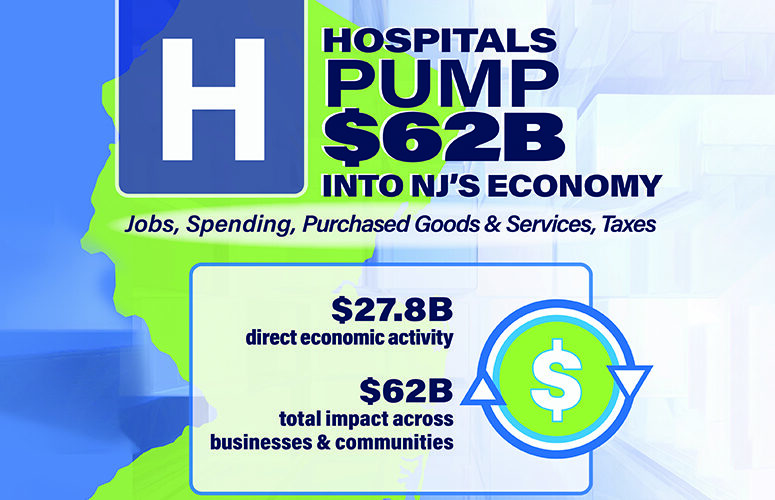
Social Determinants
Getting to the Root of a Healthier New Jersey
By Cathy Bennett, President and CEO of the New Jersey Hospital Association On Apr 2, 2019When it comes to your health, which of these four factors do you think has the greatest influence? A) Lifestyle and health behaviors, B) The medical care you receive, C) Socioeconomic status, or D) Your physical environment.
If you picked C, you are correct. Research from the National Institutes of Health based on county health rankings found that 47 percent of health outcomes are attributable to socioeconomic status. But even more eye-opening is the combined impact of socioeconomic status, health behaviors and physical environment. Taken together, those three factors account for a whopping 84 percent of health outcomes, according to this research.
That tells me that good health isn’t just a healthcare issue as much as it is a social and community issue – and we all have an important role in improving health for the people of New Jersey.
This is pretty revolutionary thinking for many of us. For generations, the hospital was the hub of healthcare. Over time, much of that care moved beyond the four walls of the hospital to community-based settings like ambulatory care and home health.
And today, we see that the radius of health and healthcare is reaching out far and wide into our communities – beyond the traditional bounds of medical services. We know now that health is influenced just as much by factors like housing, nutrition, transportation, education, employment and other aspects of our everyday lives.
We call these factors “social determinants of health.” The shift toward recognizing social issues as keys to good health is beginning to take shape in New Jersey, with partners from government, the healthcare community, social services, community groups and faith-based organizations working to address these issues.
CHARTing a Healthier New Jersey
New Jersey’s State Health Improvement Plan, called Healthy New Jersey 2020, includes goals such as creating social and physical environments that promote good health for all and promoting quality of life and healthy behavior across all stages of life.
It starts with information, and the N.J. State Health Assessment Data is an important resource. NJSHAD provides a trove of data on the health status of New Jersey residents. It includes information ranging from cardiovascular disease (the leading cause of death in New Jersey) to cancer (the second leading cause of death) to infectious diseases (the world’s leading cause of illness and death). But you’ll also find data that traditionally is outside the definition of health indictators, like air quality, violence, nutrition and obesity.
At the New Jersey Hospital Association (NJHA), we have a new data center called the Center for Health Analytics, Research and Transformation, or CHART (www.njha.com/CHART), which is taking a deep dive into this type of data to learn more about the health challenges facing New Jerseyans. Our most recent report studying chronic conditions in New Jersey – conditions such as asthma or diabetes that need proper management – shows that your zip code may be a greater factor in health than your genetic code.
CHART’s analysis found that the three poorest counties in New Jersey – Cumberland, Essex and Atlantic – had the highest rates of patients with chronic conditions presenting in hospital emergency departments. The use of the ED shows that these individuals didn’t have sufficient access to the primary care services they needed to manage their illness. Digging deeper, our zip code analysis showed a disproportional impact on African Americans, as well as correlations with unemployment rates and access to food and transportation services.
Why do chronic conditions matter? In addition to the human costs in poorer health and quality of life, studies have shown that chronic conditions cost New Jersey $29.3 billion in direct healthcare expenditures in 2016, along with $69.5 billion in lost productivity.
That needs to change. Fortunately, New Jersey is home to some exciting new models of novel partnerships to address social determinants of health.
Investing in Supportive Housing
NJHA has partnered with the New Jersey Housing and Mortgage Finance Agency (HMFA) to promote hospital investment in supportive housing in their communities. HMFA has committed $12 million in equity, to be matched by participating hospitals, to develop housing opportunities for our most vulnerable community members. That commitment of public dollars is an important first step in recognizing the need to support this growing role of healthcare providers in helping community members achieve maximum health.
There’s a strong case to be made for this investment in social determinants of health. It’s well documented that where and how people live directly affects their well-being. Those experiencing housing instability are more limited in their access to preventive health services, more likely to delay filling prescriptions, less likely to adhere to treatment plans, more likely to be hospitalized with longer lengths of stay and require more care than patients with stable living arrangements. This initiative will provide sustainable housing for these most vulnerable users of healthcare services, with wraparound support services to help them manage their health needs.
NJHA is working with the Corporation for Supportive Housing to help New Jersey hospitals and health systems advance this focus on housing. In 25 such supportive housing projects around the country, CSH has revealed significant successes in reduced healthcare utilization including:
- 44 percent fewer emergency department visits
- 39 percent fewer inpatient admissions
- 45 percent fewer days spent in the hospital
- 47 percent fewer detox visits
- 34 percent fewer ambulance trips.
There’s another fine example of a housing initiative in Cumberland County. Inspira Health Network is a founding partner in the Cumberland County Housing First Collaborative, which is providing stable and sustainable no- and low-cost housing for patients dealing with substance abuse, mental illness or other challenges. The housing includes the added support services these individuals need to sustain health and wellness. This project was one of the winners of NJHA’s 2019 Community Outreach Awards for its good work in the community.
Housing supports can take other forms as well. Knowing that isolation can be an issue for people with disabling injuries or illnesses, Kessler Institute for Rehabilitation has developed a peer-to-peer program that pairs specially trained former patients with newly injured individuals, helping them make the transition to their homes and communities after discharge from inpatient rehabilitation.
Addressing Food Insecurity
Another winner in our 2019 Community Outreach Awards is Virtua’s Mobile Farmer’s Markets which addresses food insecurity. The Center for Food Action reports that one in 10 New Jersey residents is food insecure, meaning they do not have an adequate, consistent supply of food. That translates to nearly 1 million hungry people in our state every day. In addition to having inadequate food, we have communities in New Jersey that don’t have access to the right kind of healthy food. According to the U.S. Department of Agriculture, there are 134 food deserts in New Jersey where residents have limited access to a supermarket or grocery store to access healthy foods like fresh produce. Virtua’s traveling farm stand reaches the needy areas of South Jersey, providing 40,000 pounds of fruits and vegetables to 10,000 families last year.
You’ll often see another mobile produce market around Essex County – the Wellness on Wheels van that is part of a number of food insecurity programs from Newark Beth Israel Medical Center and RWJBarnabas Health. The health system also has partnered with ShopRite stores to promote good nutrition through its “Eat Well, Be Happy” program, tackling difficult issues like obesity and associated chronic conditions like depression, diabetes and hypertension.
This work continues in communities all across the state. At the shore, AtlantiCare opens “pop up markets” at its HealthPlex facility and also provides healthy meals to kids during the summer when school is not in session. Deborah Heart and Lung Center offers a similar summer program for youth in Burlington County and its Heart Healthy Summer Challenge for families. Across the state in Hunterdon County, Hunterdon Healthcare offices screen individuals for food insecurity to help identify any individuals in need. And up north in Englewood, Englewood Health partners with local food pantries and church congregations to host nutritious dinners that also teach residents about the dangers of obesity and diabetes.
Beyond housing and nutrition, other innovative programs include: a wellness alliance with Cape Regional Medical Center and local agencies to help address childhood trauma; Hackensack Meridian Health’s partnership with Uber to provide transportation to medical appointments; a youth summer camp offered by Trinitas Regional Medical Center; and a partnership between CentraState Medical Center, the Visiting Nurse Association and other groups to locate a new clinic in the heart of Freehold Borough to ease transportation barriers. Those are just a sampling of the initiatives healthcare providers have launched to address social determinants of health in their communities.
Envisioning the Future
Much has been said and written about the need to redesign our nation’s healthcare system. There’s no doubt that we need a well-integrated and coordinated system of care where all individuals have access to the right care, at the right time, at the right location. We now recognize the influence of social factors like a safe place to live, nutritious foods, schools that provide a supportive environment to learn and grow, neighborhoods safe for running and playing and jobs that pay a livable wage.
The next key step is developing payment models that begin to recognize these investments in social determinants of health. Researchers at Harvard and Yale call it the “wrong pocket problem,” in which entities that invest in community health improvements don’t always benefit from the savings. That can inhibit the type of collaboration across sectors that we need to fully address community needs. I would argue that our current payment models in healthcare – whether it’s government programs like Medicare or Medicaid or private insurance – have some catching up to do in reimbursing healthcare providers for these wise investments in good health.
Just imagine if that system of coordinated healthcare and social determinants of health had policies and payment models that were actually aligned with that vision. As I see these projects taking root at the community level, I truly believe New Jersey can be the innovator to make it happen.
About the Author: Cathy Bennett is president and CEO of the New Jersey Hospital Association, whose mission is to improve the health of the people of New Jersey.
To access more business news, visit NJB News Now.
Related Articles:





